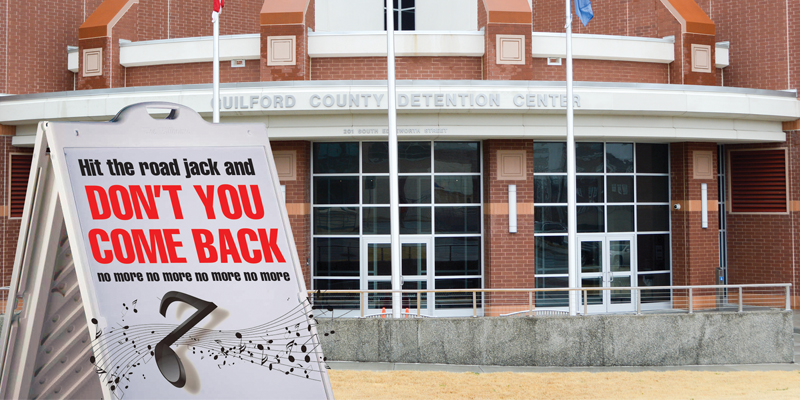The North Carolina Department of Public Safety has just granted Guilford County $150,000 to help in the county’s effort to cut down on criminal recidivism. The money will be used to establish a new “Reentry Council” that will assist former inmates as they reenter free society after serving time. The office for the council will be at 2301 W. Meadowview Road in Greensboro at the NCWorks Career Center.
The program will use the $150,000 – an amount likely to recur in coming years – to work with men and women released from prison and jail. The Reentry Council, which has been in the planning stages for over a year, will help the former inmates find employment, housing, job training and treatment for alcohol and drug abuse – and it will provide many other services meant to keep former offenders from turning to crime.
Guilford County Sheriff’s Department Major Chuck Williamson, who runs the county jail in Greensboro, will oversee the program. He said for some reason a lot of ex-convicts choose to come to Guilford County. Williamson said he was talking to another law enforcement officer involved in the reentry effort statewide, and when the other officer found out Williamson was from Guilford County, he informed Williamson that more ex-cons moved to Guilford County than to any other county in North Carolina.
“He said, ‘Wow, you know Guilford County leads the state,’” Williamson said.
Williamson said he’s not sure why that is, but it makes it all the more evident of the need for the Reentry Council in Guilford County. He said there are already more than 30 pubic and private community partners on board and others are expected to come on board.
“We’re hoping to add some more,” he said.
He also said the program will hire a coordinator and two caseworkers. Those three, under direction of the board overseeing the program, will work with everyone from employment agencies to housing groups to mental health and drug treatment agencies. Williamson said a wide variety of services will be offered by a collective of nonprofits, government agencies and others.
He said it makes sense to put time and money into the reentry program because it’s much more cost effective than seeing these people return to prison and jail – sometimes perpetually.
“Prison beds are expensive,” Williamson said.
He said the county’s program will seek out people who are leaving prison or jail and are planning to live in Guilford County.
Williamson said it’s easier to work with those coming out of prison than those leaving jail. Prison release dates are known well ahead of time, but jail inmates may be bailed out or see delays in trials – so it’s generally harder to know when they will reenter society or what their plans are when they do. Williamson said a very limited number of people are serving their sentences in the Guilford County jails; usually convicted criminals are sent to state prison to serve their time.
According to Williamson, a lot of organizations across the county are working to help former prisoners reenter society, but the new Reentry Council will provide much needed coordination between those services.
Guilford County Sheriff BJ Barnes, who serves on the Governor’s Crime Commission, said state officials have a lot of faith in the county’s Sheriff’s Department, which is one reason, he said, the department was chosen to receive the grant. The sheriff said state law enforcement officials are familiar with the efforts of the Guilford County’s Sheriff’s Department to cut down on recidivism.
“They know we will deliver,” he said.
Barnes said something has to be done to end the constant cycle of crime.
“We need to keep them from coming back into the system,” he said, adding that that means helping former convicts get jobs, housing, “personal support” and more.
“I do not want them back in my jail,” the sheriff said.
Barnes said recidivism isn’t as high in Guilford County as it is in other counties, but the county needs to reduce it.
Guilford County’s new program and similar ones across the state are funded through a $1.75 million federal grant that the US Bureau of Justice Assistance provided to the NC Department of Public Safety in October 2015 “to enhance transitional services, expand reentry councils” and continue reforms that were started under the Justice Reinvestment Act in 2011.
The state’s Department of Public Safety, which has had a new emphasis on reducing recidivism in recent years, also awarded contracts to establish similar new councils in Cumberland and Forsyth counties, as well as joint operations between Craven and Pamlico counties and Onslow and Jones counties.
Barnes said the 1,032-bed county jail that opened five years ago in downtown Greensboro has 40 beds for mental health patients and 40 for inmates with drug problems. He said that helps fight recidivism but he hopes the new program will be able to keep mental patients from returning to jail.
“We get people in there with mental health issues,” Barnes said, “and they aggravate the hell out of other inmates,” who, quite frankly, aren’t in the best mood to begin with given that they’re in jail.
There are already a number of Reentry Councils across the state – networks of community-based organizations that cooperate to assist ex-offenders get the food, clothing, treatment, transportation and mentoring they need. As in Greensboro, the mission of those councils is to develop and coordinate resources in the community to support ex-offenders and reduce recidivism.
The latest move comes four years after a previous round of councils was formed in the state. In 2013, five reentry councils were begun including councils in Buncombe and Mecklenburg counties. In January 2017, four new reentry councils started in Wake, Durham, New Hanover and McDowell counties.

